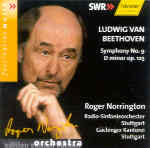This exciting and accomplished performance of Beethoven’s Ninth conclusively proves that neither Roger Norrington nor that pathetically scrappy pick-up orchestra gathered together under the deceptively impressive name “London Classical Players” had any business touching Beethoven 15 or so years ago when Norrington’s atrocious complete symphony cycle was recorded by EMI. Obviously in the intervening years Norrington has learned to conduct this music, and he now has a real orchestra that knows it well enough to adapt to “period style” while still retaining basic ensemble values of full tone, good intonation, accurate rhythm, and proper sectional balance. Indeed, direct comparison between his two recorded performances is so embarrassing to the first of them that you can only hope that certain members of the critical profession, particularly in Britain, might pause for a moment and reconsider the basis of their ludicrous effusions regarding those EMI efforts, both on initial release and as recently repackaged on Virgin Classics.
From the beginning, Norrington shows that he has formed some new ideas about this music, and they are good ones. The initial string sextuplets begin with a slight sforzando, and the ensuing dynamic hairpins underlining the opening theme as it gathers itself in the full orchestra establish an atmosphere that crackles with an excitement that never lets up. Notice how much more cataclysmic Norrington manages the onslaught into the recapitulation, thanks to extra care over dynamics, allowing sufficient time for the timpanist to get his rhythms right, and to having an orchestra that doesn’t sound like a sour village band with a few lame strings attached. The same movement’s coda similarly benefits this time around from a bass line that you can actually hear.
The scherzo sports superior rhythmic definition right from the start, but the most fascinating comparison with the earlier version comes in the climaxes of the second half, where the colorful clarity of textural detail in the brass that Norrington uncovers now sounds intentional with players comfortable in their parts and the long line firmly in place, rather than simply spastic and ugly. As for the Adagio, it has gained a minute in this new recording, all to the good, and while I still dislike the extremely rapid tempo and vibrato-less strings, there’s no denying the movement’s impressive onward flow. Combined with incalculably more listenable string playing, the result at least gives some semblance of the sublime repose that Beethoven wrote into the music.
Norrington has made two crucial changes to his view of the finale that demonstrate just how far he has come from his days as a mindless time-beater and “authentic-instrument” opportunist. First, he now plays the march episode at a true march tempo instead of the ridiculous, weary tread he adopted in his first go-round. Second, the final choral apotheosis (the 3/4 Maestoso) just before the coda now has the right sense of grandeur and gravitas (metronome marks be damned!), whereas previously he simply rushed through it as if in a hurry to get the whole mess over with. His handling of the too-often-nasty-sounding “Seid umschlugen” episode with trombones also is particularly masterful, powerfully phrased and vividly communicative.
Excellent choral singing, very good solo work, and absolutely stunning live sonics (you can understand every word of the chorus, and the balance between voices and instruments is perfect) provide the icing on the cake. The result is as fine a Beethoven Ninth (of its type) as we are likely to hear these days. It doesn’t efface the great “standard” versions of Wand (RCA), Böhm/Vienna I (DG), Barenboim (Teldec), or Fricsay (DG), but it’s a performance that does the players, and particularly the conductor, proud. It’s also the Ninth that Norrington should have given us in the first place. Better late than never! [3/8/2003]
































